
Find out why these gay and bi men have decided to go on PrEP.
March 03 2016 5:00 AM EST
May 26 2023 2:05 PM EST
By continuing to use our site, you agree to our Private Policy and Terms of Use.

Find out why these gay and bi men have decided to go on PrEP.
Despite recommendation by the Centers for Disease Control and Prevention, and studies that indicate that PrEP can reduce HIV transmission by 96 and up to 99 percent, there are still relatively few gay and bisexual men on the drug.
It can be hard to find anyone among your friends to ask about it. And what makes a person decide they want to go on the once-daily pill varies a lot. Plus reached out to gay and bi men, as well as serodiscordant couples, who use the drug to hear their reasons. They offered advice for those on the fence about it. Read their stories in their own words.
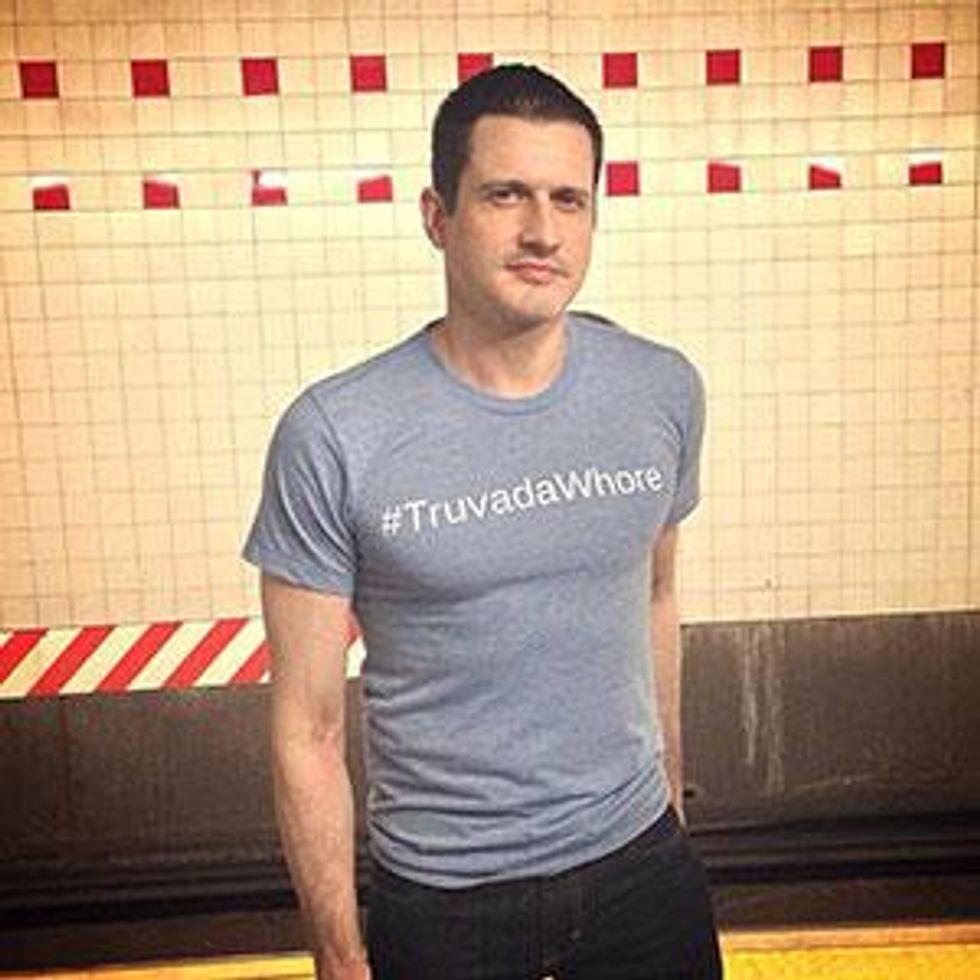
Damon L. Jacobs
43
New York, New York
Licensed Marriage and Family Therapist
When did you decide to start taking PrEP, and what prompted the decision?
The end of a long-term relationship, turning 40, and realizing that condoms were not being used the way they used to be a decade earlier. I started to conceptualize HIV as a "when" not an "if." Then, once I learned about PrEP, I spoke to my doctor, and we agreed this was the most appropriate prevention strategy.
How has PrEP changed your dating life?
PrEP has changed my dating life, because it has completely removed the fear of HIV from sex. I had never experienced sex without fear in my life. As the receptive partner, I had always made my HIV status contingent on the "top" using a condom, making sure it didn't fall off, fall in, or break. With PrEP, I could make rational decisions about my sexual choices and still remain 100 percent in control of my negative HIV status. That has increased my romantic and sexual connections greatly.
Have you encountered stigma? If so, how have you addressed it?
I have encountered incredible stigma because of being so open about using Truvada as PrEP. I handle it by remembering the truth: This is a way to prevent HIV. When getting attacked by others, I stick to scientific facts versus moralistic opinions. Also, I remember conversations with my friends and loved ones who died from AIDS. They wanted me to live, they wanted me to thrive, they wanted me to fight. They would have taken PrEP to stay alive if they had had the choice. I speak out for them, as much as for myself. That makes the stigma and attacks tolerable.
What advice would you have for those who are on the fence about PrEP?
For anyone on the fence I ask: If you were a woman would you take birth control pills to prevent pregnancy? If we had a vaccine for HIV, would you take that? You may not be at risk for pregnancy, and we may never have a vaccine, but for now we have an effective bio-medical strategy that reduces risk of HIV by 99 percent. If you feel it's for you, talk with your doctor.
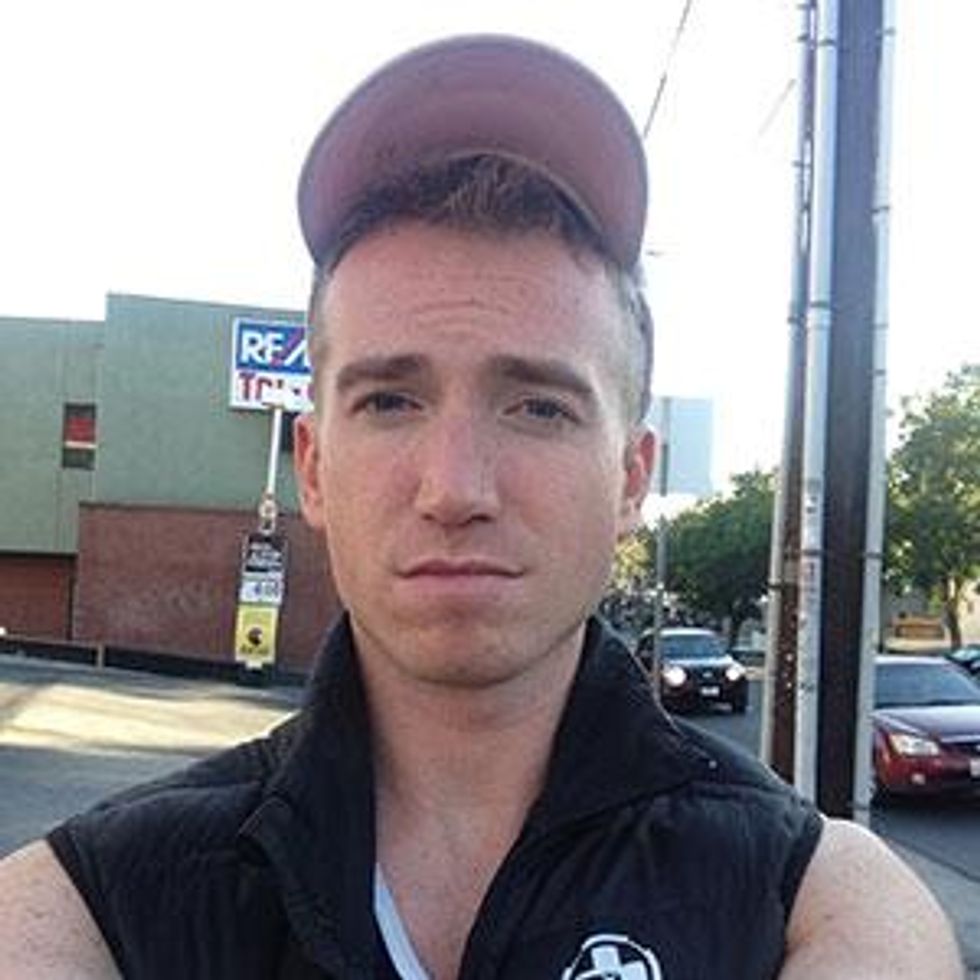
Christopher Glazek
29
Williamsburg, New York
Executive editor at Genius.com
When did you decide to start taking PrEP, and what prompted the decision?
I started taking it after writing about it for The New Yorker. In the course of my reporting, it became clear to me that there was no reason not to take it! It's time to leave AIDS in the past.
How has PrEP changed your dating/romantic life?
Not a whole lot. Since I started taking it, my use of condoms has decreased a bit. My number of sexual partners has gone down, too. Those things are probably related.
Have you encountered stigma? If so, how have you addressed it?
I haven't encountered stigma from people I know. I've convinced a lot of friends to go on it, though some remain skeptical. On Grindr, I've definitely encountered stigma, which is ironic, and anecdotally, I've heard a lot of people on PrEP say they tend not to mention it to strangers. I guess some people worry that PrEP-sters are having more condomless sex and so might be more likely to have other STDs, but that's not borne out by any data. It's ironic, because a lot of people on Grindr want to bareback, but apparently only if you're not on PrEP. I think the fantasy that people want to believe is that they're propositioning someone to bareback who normally never does it but is willing to make an exception for one terrifically hot person. PrEP quashes that fantasy.
What advice would you have for those who are on the fence about PrEP?
I think people agonize a lot over the question, "Am I really at risk?" We know that people systematically underestimate their risk, but risk also isn't the whole story. It's good politics to be on PrEP—it's good to want the AIDS epidemic to end. It's also good to be able to truthfully say to your poz friends, "This is literally something that doesn't even potentially matter to me." Sexual exclusion of poz people is a very real and very shitty thing. When you go on PrEP, you're not neg or poz anymore — you're "post."
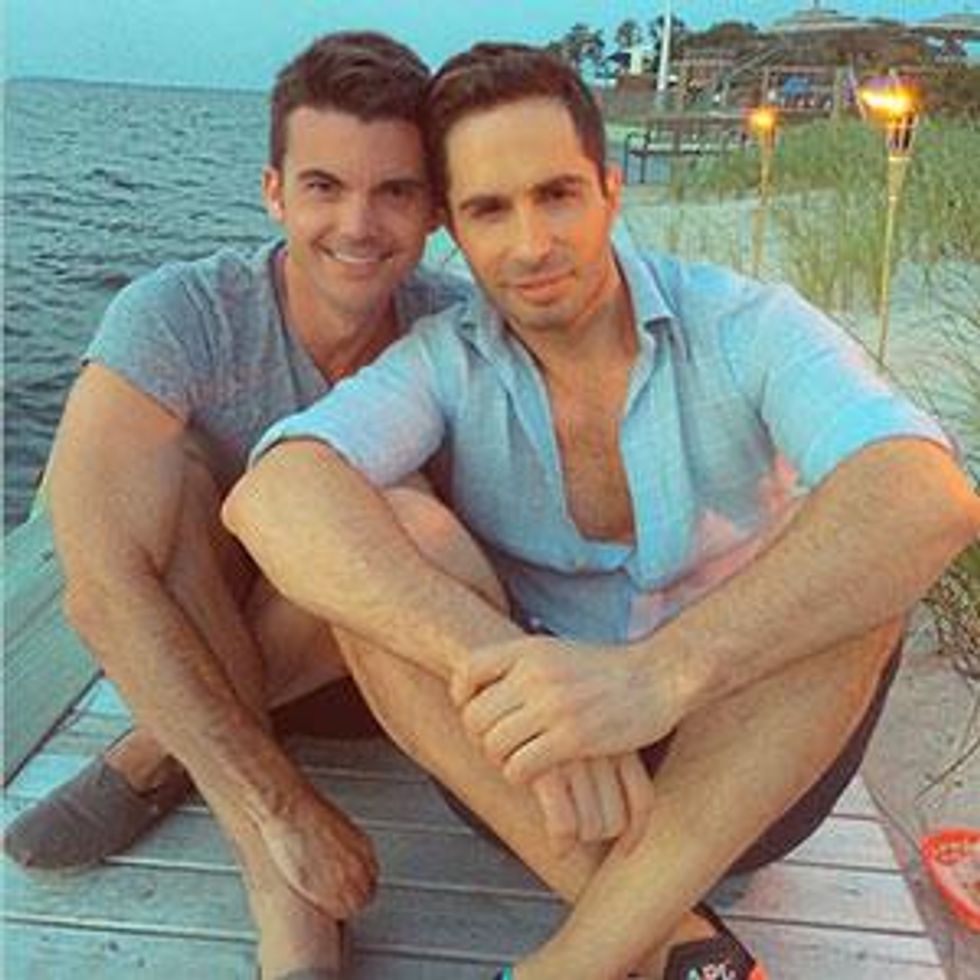
Michael Lucas & Tyler Helms
42 & 33
Manhattan, New York
CEO of Lucas Entertainment & SVP at Deutsch Advertising
When did you decide to start taking PrEP, and what prompted the decision?
ML: I decided to start taking PrEP before I met my partner, Tyler, who is HIV-positive. I have been taking it for two years, and it had more to do with the line of work I am. But being with someone who is HIV-positive, it only makes sense to add that layer of protection for both people’s piece of mind.
How has PrEP changed your relationship?
ML: No, it did not change the relationship, as I was already taking it before. I will say that if it wasn’t for my job, I likely would not be taking it, as Tyler is on medication and undetectable, and it has been proven that the risk for transmission from someone who is undetectable is extremely low, if at all.
TH: It has only made the relationship better. PrEP allows two people of different status to have a healthy sexual relationship without fear and shame. That has a dramatic impact on the overall success of a relationship.
Have you encountered stigma? If so, how have you addressed it?
ML & TH: People don’t talk about PrEP enough. When things aren’t talked about, there is stigma. But we both agree the stigma that comes with HIV infection is far more damaging than the stigma associated with PrEP. People need to be educated and take the steps to protect themselves regardless of what people think.
What advice would you have for other magnetic couples who are on the fence about PrEP?
ML: I agree with the World Health Organization, and I recommend that all sexually active gay men be on PrEP. I think it is wise to take advantage of such an amazing medical achievement.
TH: I don’t understand why people would not take advantage of what I consider the most important step in HIV prevention to date. It’s not a debate, it’s a decision that I wish more people would make.

David Grodsky
44
San Francisco
Regulatory Compliance Analyst
When did you decide to start taking PrEP, and what prompted the decision?
I first heard of PrEP in October 2013, when I read an article on a study about the first year of Truvada's use as pre-exposure prophylaxis. The idea that I could take a pill to give me near full protection from HIV infection was radical and very appealing to me. I have no issue with having sexual intercourse with HIV-positive guys, but I know how to navigate those waters to minimize the chance of infection. Having a way to lower that risk even more sounded like a great idea. More importantly for me though, I used to be an active fister, but backed off it several years ago after two different people I knew contracted HIV where fisting was strongly suspected as the means of transmission. While I'm not against gloves, a lot of guys simply don't like the feel. Since my cuticles tear easily, I admit I got scared and decided to simply stop all together. I did my homework on PrEP and after talking with a new doctor—mine admitted she knew nothing about it and recommended someone for me to see. I decided to go on it December 2013.
How has PrEP changed your relationship or dating life?
It hasn't changed my behavior other than I am now fisting again. I'm as sexually active (or not) as I was prior to being on it. I know there are other STDs that can be transmitted during sexual intercourse or fisting, and I do take those factors into account. It's just nice knowing that the biggest risk is now off the table.
Have you encountered stigma? If so, how have you addressed it?
In person, the only reaction I have ever received from people is getting questions about it, either what PrEP is or how my experience has been. At first, any place I posted online about taking PrEP was met with derision and slut shaming. I never bothered to explain my specific reason for wanting to take it, but I did become annoyed by some people's active ignorance about it, as if just learning about PrEP was somehow something bad. I tried to share information about it, but after a short time, I gave up.
What advice would you have for those who are on the fence about PrEP?
1) Talk to people who are on it. Every guy I know who takes PrEP is a fountain of information for anyone with questions. Don't be afraid. If someone does happen to take offense, keep looking.
2) Talk to your doctor and if he/she is not receptive or knowledgeable, find another one who is. Many local AIDS and HIV support centers know who the most involved doctors are.
3) Get yourself educated. PrEP is an effective but not magical pill. There are risks with Truvada. I have a history of minor kidney problems that required me to adjust a different prescription I take in order to get my numbers where they needed to be. Plus, there can be side effects. I've had to make some dietary and supplement changes to mitigate the minor intestinal distress I'd get. However, some guys I know have zero side effects.
4) Understand your insurance and total costs. Almost all major carriers cover PrEP, but you still have to pay for regular doctor visits and blood tests, which are a separate issue. There are a wide variety of available co-insurance plans that cover PrEP. My insurance covers it, but I have a $50/month copay. Turns out in California, Walgreens has a $10/year co-insurance that covers my copay, so my out of pocket each month is zero.
[Editor's note, many drug companies offer patient assistance discounts. Here's Truvada's.] Check NASTAD's website for more information about insurance and assistance.
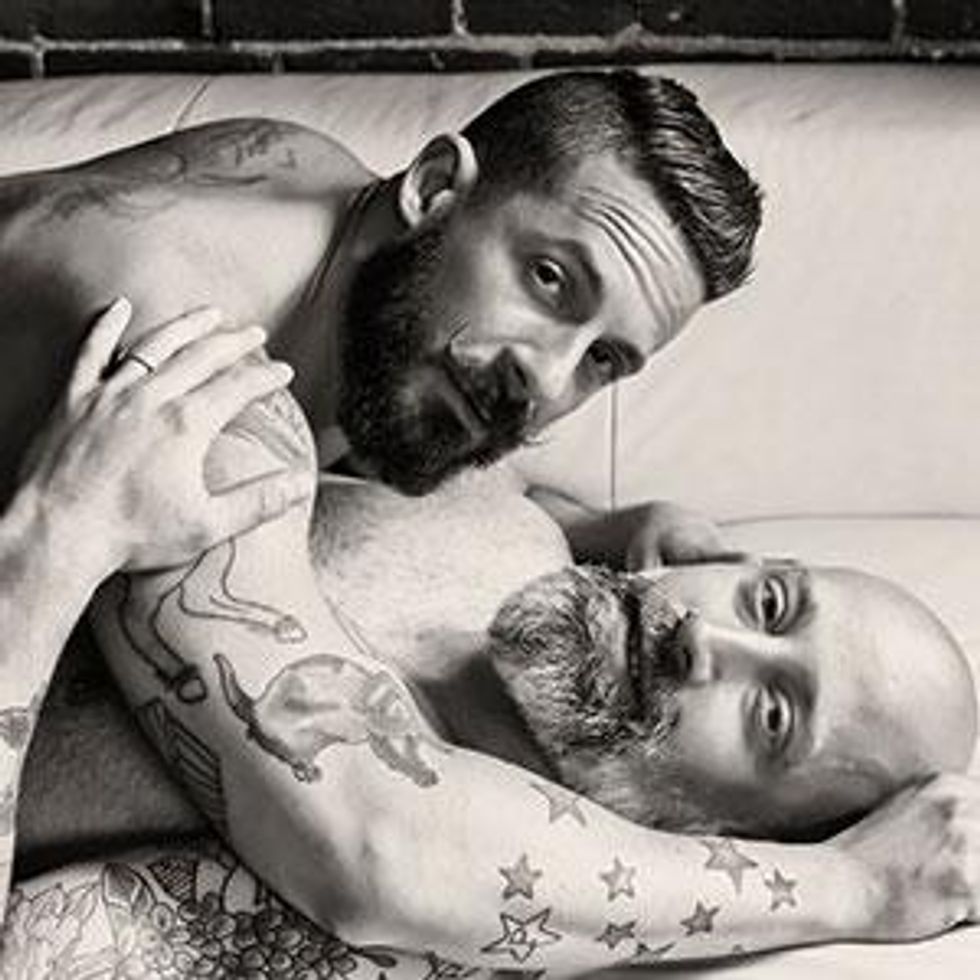
Patrick Buzzell & Christian Stanley
37 (both)
New York (Boston transplants)
High School Teacher & Brand Manager at Saks Fifth Avenue
When did you decide to start taking PrEP, and what prompted the decision?
PB: I started taking prep a year and a half ago as part of a study through my health care provider services at Fenway Health. I had heard about PrEP and wanted to give it a try, since we are in a magnetic relationship. I know my husband is undetectable, but we wanted an added measure of security to our intimacy.
How has PrEP changed your relationship?
PB: PrEP has given us more ease when thinking about HIV. I know my husband would never want me to contract the virus from him, so this provides both of us with more comfort knowing that added level of protection is there.
Have you encountered stigma? If so, how have you addressed it?
Oddly enough, the only stigma that we have encountered in regards to PrEP is from people who have worked in the HIV/AIDS arena for many years. For example, we were given a very distasteful look from a gentleman who did counseling and testing for a nonprofit when we talked about PrEP. Apparently, he was a little bitter from his 20 years of work. Other than that, the only thing we encounter is guys who have no idea, or misinformation, about PrEP. Then we move into our educational speech drawing from all the great information we received through Fenway Health. I am still shocked when I encounter gay men who have no idea what PrEP is and have never even heard it mentioned.
What advice would you have for other magnetic couples who are on the fence about PrEP?
If you are on the fence about PrEP I would suggest you talk to a health care professional that you trust. I would also recommend doing your homework and reading as many research articles that you can. There are a lot of rumors circulating about PrEP and educating yourself and being your own advocate is your best decision. Also, try talking to a couple, or a single friend, who is on PrEP and get their advice.
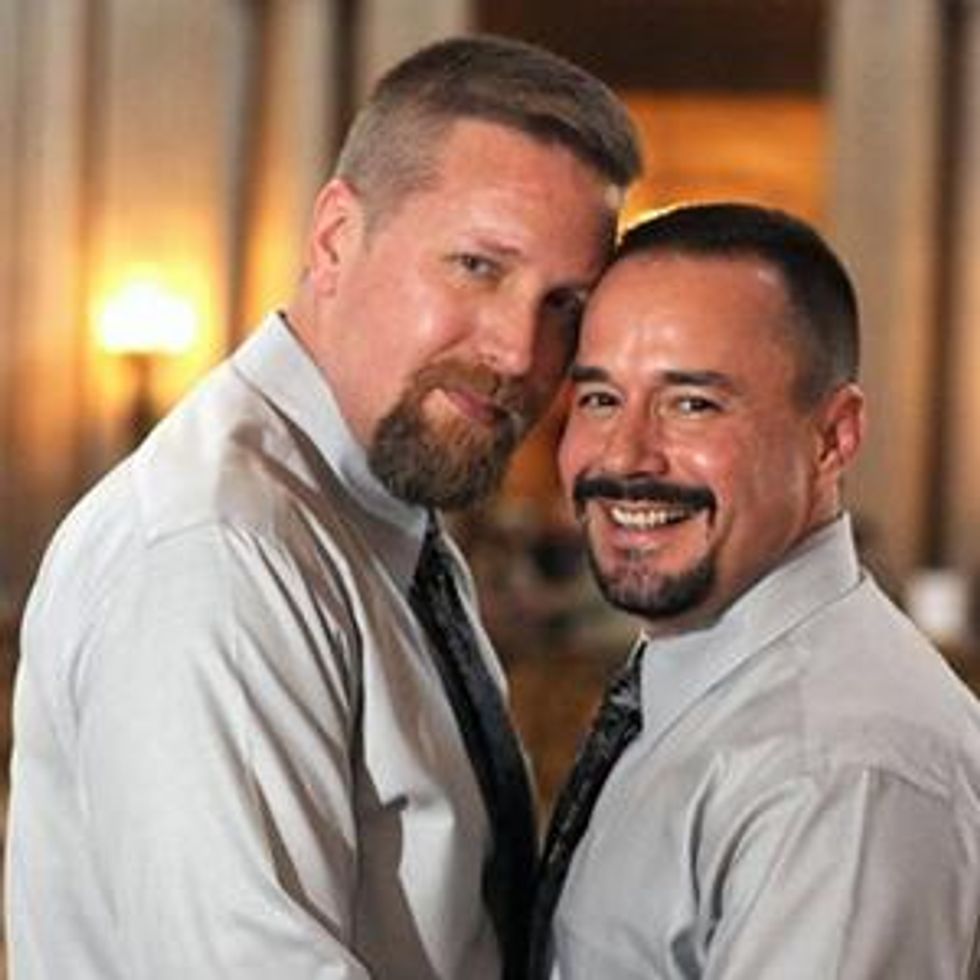
51 & 53
San Francisco
Wholesale Manager at Mr S Leather & "Vibe Manager" at Pager Duty
When did you decide to start taking PrEP, and what prompted the decision?
DM: After several months thinking about if this was right for me, which included a lengthy conversation with my doctor, I made the decision to start PrEP on June 30, 2014. My insurance carrier is Kaiser Permanente, and they have very stringent testing for any participant in the PrEP program. This was also a plus in the pre-PrEP decision for me.
How has PrEP changed your relationship or dating life?
DM: Since I am married to an HIV-positive man, PrEP has taken away any concerns for transmission to me. Even though I've always known that since he is undetectable, and I've almost always been the top in our relationship, there was always a small thought in the back of my mind about it. Now, I have no concern, and I'm even wondering if that was part of the reason that I'm not more versatile. Also, we are not monogamous, and PrEP gives me total confidence that I will remain negative.
Have you encountered stigma? If so, how have you addressed it?
DM: I'm fortunate that I live in San Francisco. So many of my friends are educated on PrEP and it's benefits. Many of my positive friends were the most encouraging for me to start. I now have become an activist on behalf of PrEP. I have put it on all of my social media accounts and welcome dialogue in hopes that I might educate someone. I have occasionally had some detractors on some of my public postings. I remind myself to keep my temper in check (not always easy being part Italian) and to use up-to-date information when I enter a discussion with them.
What advice would you have for those who are on the fence about PrEP?
DM: I would advise anyone who is thinking about starting PrEP to talk to people including their doctor. Don't take ad campaigns as facts. Do your own research. And make an educated decision about whether it is the right thing for you or not.
My personal mantra is "Knowledge is Power."